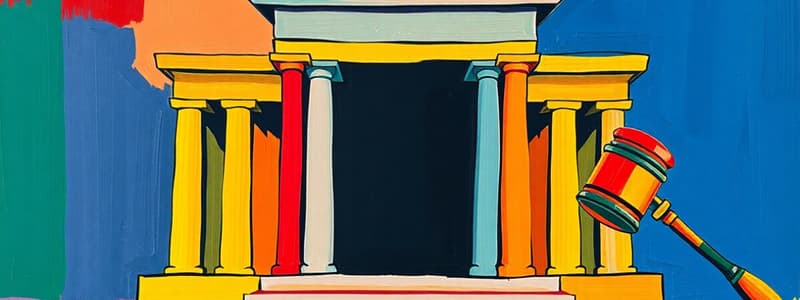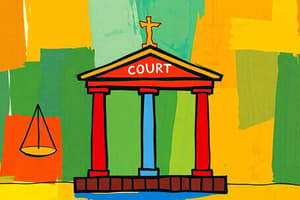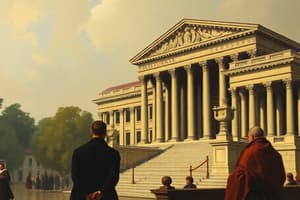Podcast
Questions and Answers
What is one of the responsibilities of U.S. Attorneys?
What is one of the responsibilities of U.S. Attorneys?
- To enforce federal laws and represent the United States in court (correct)
- To issue Supreme Court writs
- To conduct jury trials
- To confirm judicial nominations
Which body confirms judges nominated by the President?
Which body confirms judges nominated by the President?
- The Supreme Court
- The House of Representatives
- The Department of Justice
- The Senate (correct)
What distinguishes Judicial Restraint from Judicial Activism?
What distinguishes Judicial Restraint from Judicial Activism?
- Judicial Restraint encourages broad interpretations of law, while Judicial Activism restricts it
- Judicial Restraint limits the role of the courts in policy-making, while Judicial Activism promotes it (correct)
- Judicial Restraint only applies to constitutional cases, while Judicial Activism applies to federal cases
- Judicial Restraint is favored by Congress, while Judicial Activism is opposed
For how long do U.S. Marshals serve?
For how long do U.S. Marshals serve?
What does Congress set for Federal judges?
What does Congress set for Federal judges?
What is meant by Judicial Activism?
What is meant by Judicial Activism?
Which of the following is NOT a responsibility of U.S. Marshals?
Which of the following is NOT a responsibility of U.S. Marshals?
Public opinion can sway the Supreme Court's actions. How does this influence justices?
Public opinion can sway the Supreme Court's actions. How does this influence justices?
What does the 'rule of four' dictate?
What does the 'rule of four' dictate?
Flashcards
Constitutional Court Judge Appointment
Constitutional Court Judge Appointment
Judges of Constitutional Courts are appointed for life, meaning their terms are indefinite.
US Attorney Responsibility
US Attorney Responsibility
Representing the U.S. government in legal matters, especially in criminal prosecutions.
Judicial Restraint vs. Activism
Judicial Restraint vs. Activism
Judicial Restraint limits courts' interpretation of the Constitution, while Judicial Activism expands it.
Senate Confirmation of Judges
Senate Confirmation of Judges
Signup and view all the flashcards
US Marshal Term
US Marshal Term
Signup and view all the flashcards
Non-responsibility of U.S. Marshals
Non-responsibility of U.S. Marshals
Signup and view all the flashcards
Judicial Activism
Judicial Activism
Signup and view all the flashcards
Congress's role with Judge Salaries
Congress's role with Judge Salaries
Signup and view all the flashcards
Instructions from Judge to Jury
Instructions from Judge to Jury
Signup and view all the flashcards
Study Notes
Appointments of Constitutional Court Judges
- Length of appointment varies depending on the specific court and jurisdiction. The provided text does not give a specific length.
Responsibilities of U.S. Attorneys
- Representing the United States in legal cases.
Distinguishing Judicial Restraint from Judicial Activism
- The text does not define or distinguish the two.
Body Confirming Judicial Nominations
- The Senate confirms judges nominated by the President.
Terms of U.S. Marshals
- The text does not specify the term of service for U.S. Marshals.
Non-Responsibilities of U.S. Marshals
- The text does not list specific non-responsibilities.
Judicial Activism
- The text does not define judicial activism. More context on this needs to be provided for proper understanding.
Compensation of Federal Judges
- Congress sets the salaries of federal judges.
Judges' Role in Trials
- Judges explain the law to the jury. They don't present evidence themselves.
Supreme Court Case Selection Criteria
- Significance, conflicts among lower courts. The text does not mention the third factor.
Supreme Court Orders
- A writ of certiorari is an order for the Supreme Court to review a lower-court case.
Supreme Court Representation
- The Solicitor General represents the U.S. government before the Supreme Court.
Supreme Court Hearing Procedures
- The rule of four requires at least four justices to agree to hear a case.
Differences between Supreme Court and Trial Court
- Supreme Court focuses on legal issues, not evidence presentation.
Oral Argument in Supreme Court
- Arguments are presented to the justices on the basis of legal principles, not for determining evidence.
Enforcement of Supreme Court Decisions
- The executive branch (the President) or the appointed officials will enforce the court's decision.
Judicial Restraint
- Judicial restraint means limiting the court's power and interpretation of the constitution.
Influence of Public Opinion on the Supreme Court
- Justices may consider public opinion when making decisions. The text does not specify the extent of influence.
Interpretation of the "Living Constitution"
- Interpretation of the Constitution should consider modern societal changes.
Studying That Suits You
Use AI to generate personalized quizzes and flashcards to suit your learning preferences.




